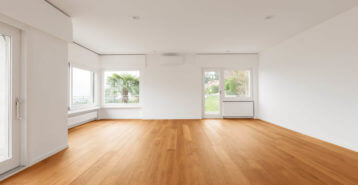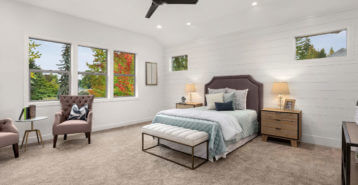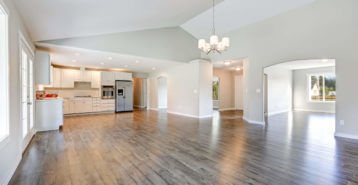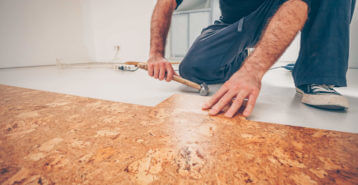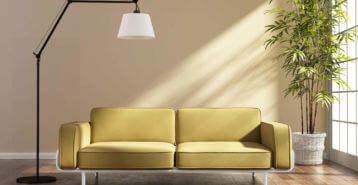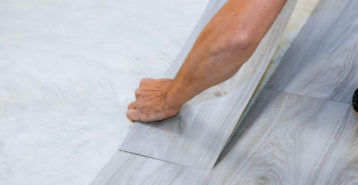How Much Does Tile Installation Cost?
Tile flooring: It’s versatile, durable, affordable, easy to install, and fits any design style. There is a reason it is found in so many homes. A tile flooring installation is a go-to choice for homeowners. In fact, Consumer Reports chose tile as their top pick for almost every single room in a home. In this guide, you’ll learn about average tile installation costs for your home’s floors, pros and cons, and more.
Tile floor installation can cost anywhere from $3 to $20 per square foot for the tiles themselves. However, some higher end types of tile can run as high as $50 per square foot. Professional labor and installation typically starts at an additional $5 per square foot of tile installed. Underlayment, if needed, costs $0.50 to $1 per square foot on average, and grout costs $1 to $2 per square foot on average.
In total, the cost to install tile floor runs between $9.50 and $28 per square foot, which includes materials, labor, underlayment and grout.
No matter your style preferences and budget, there should be a type and design that works for you. Be sure to ask your contractor about your different tile options and their cost estimates per square foot before beginning your project.
Tile Installation Cost by Type
The cost of tile flooring can vary significantly based on a number of factors, including the type of material, the manufacturer, the complexity of the design, and the region in which you are shopping.
Ceramic tends to be on the lower end of the price spectrum at around $5 per square foot. Porcelain tiles are also quite affordable and start at just $3 per square foot. Natural stone tiles, such as marble, are on the higher end of the cost spectrum. They can cost as much as $18 to $20 per square foot depending on the quality.
Below you can explore the average cost to install tile floors by type of tile:
| Type of tile | Average cost per square foot |
|---|---|
| Ceramic | $1 to $5 |
| Porcelain | $3 to $10 |
| Vinyl | $2 to $8 |
| Linoleum | $2 to $5 |
| VCT (Vinyl Composition Tile) | $0.50 to $2.50 |
| Granite | $5 to $30 |
| Travertine | $3 to $30 |
| Cement | $8 to $20 |
| Glass Mosaics | $10 to $50 |
| Luxury Vinyl (LVT) | $3 to $10 |
| Terazzo | $10 to $50 |
| Custom or Artisan | $25+ |
When choosing between types of tile for your home, consider your budget and style preferences, as well as the tile’s hardness and durability, moisture-resistance, and maintenance needs. Ceramic and porcelain tiles tend to be the most waterproof and affordable types of tile, while natural stone and mosaic tiles are great for decorative design but tend to be more expensive.
Prices for materials can also change over time due to fluctuations in demand, production costs, and other economic factors. Therefore, it’s important to check with local contractors for the most up-to-date and location-specific pricing. Ask for advice on which type is best for your budget and rooms.
How Much Should Labor Cost for Tile Installation?
The labor and installation costs for tile floor installation can vary depending on several factors, including the complexity of the project, the type of tile, the condition of the subfloor, the region or country where you are located, and the contractor’s experience and overhead.
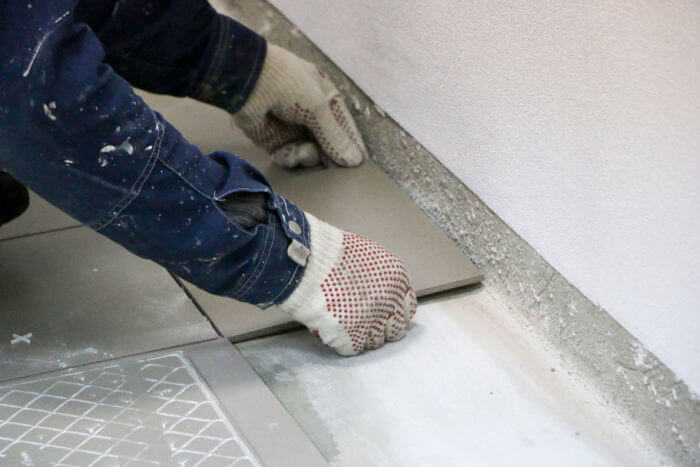
Here is a breakdown of what these costs might include and how they might vary:
Basic Installation Costs
Typically, a basic tile installation costs between $4 and $8 per square foot for labor. This usually includes basic preparation of the area, laying the tiles, and grouting.
Moderate Installation Costs
A moderate tile installation typically costs between $8 and $12 per square foot for labor. This range might include more complex installations, such as those requiring significant floor leveling, the installation of a backer board, or the use of specialty tiles that require more intricate work (like natural stone or mosaics).
High-End Installation Costs
A high-end tile installation typically costs between $12 and $15 per square foot or more for labor. This range typically involves complex or custom installations, potentially with high-end or delicate materials, intricate patterns, or significant floor preparation work. It might also include the cost of a highly experienced and sought-after contractor.
Additional Costs
Some projects might require additional costs, such as the removal and disposal of old flooring, significant floor leveling or repair, the installation of a waterproofing membrane, or the need to work around obstacles like pipes or built-in cabinets. Each of these factors can add to the total cost of the project.
Labor costs can also vary significantly by region due to differences in the cost of living, prevailing wage rates, and local competition among contractors.
Established contractors with a strong reputation may charge more for their services, reflecting their experience and the potentially higher quality of their work.
It is crucial to get a detailed estimate from three to four contractors before proceeding with a tile installation project. This estimate should break down all the costs involved, including materials, labor, and any additional charges that might arise based on the specific conditions of your project.
Tile is the Most Popular Flooring Choice
In a September 2023 survey by Modernize of thousands of homeowners, tile ranked as the most popular flooring already installed in homes, with 23% of respondents indicating they had tile floors. It took the number one spot from carpet flooring, which ranked as the most common option in our 2021 survey.
Of more than 2,500 homeowners who planned to install new floors in the next year, tile was the second most popular response, with just over 15% of respondents indicating it was their number one pick.
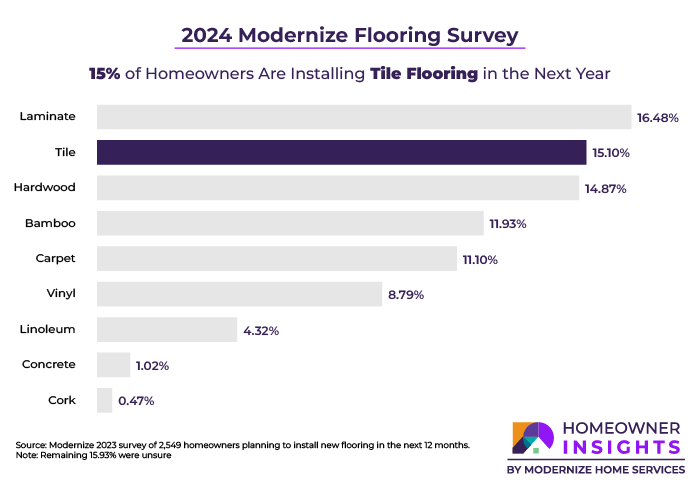
Which Rooms Are Best for Tile Floors?
Tile flooring is water-resistant and moisture-resistant. For this reason, it is a great flooring choice for areas of the home that are prone to wetness or dampness. Additionally, tile floors are easy to clean and mop regularly, so they make good flooring for high-traffic rooms. Here are a few rooms where tile flooring tends to work best.
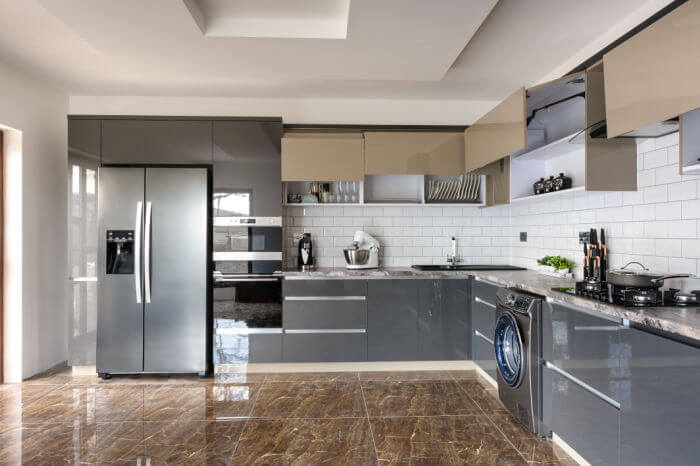
- Bathrooms. Tile is the most commonly used bathroom flooring material thanks to its waterproof and humidity-resistant qualities. Homeowners often use tile for more than just bathroom flooring. Tile comes in a variety of shapes and styles and can also be used for bathroom backsplashes, showers, and more.
- Kitchens. Tile works great in kitchens because it creates a sleek look and is water resistant. Spills in the kitchen are no match for tile flooring. Plus, since kitchens are almost always heavy traffic areas of the home, tile’s low maintenance will be a life saver. Add extra flair to your kitchen by installing backsplash tiles that coordinate with your flooring.
- Laundry rooms. Designated rooms where you do your laundry are also a great fit for tile. Where water is present, tile floors will be the easiest option to clean regularly.
Note that tile floors can also be good choices for bedrooms and living rooms, if you are looking for flooring that is easy to sweep and mop. Tile is also a good choice in any room where pets like to hang out, as it will be easy to clean up your pet’s messes. If you’re concerned about coldness and comfort, you can always use an area rug in certain areas of the room.
Benefits of a Tile Flooring Installation
As mentioned, there are plenty of benefits to installing tile flooring in your home. Tile is a high quality material that comes with handfuls of benefits, including:
- Easy upkeep. Being easy to clean and difficult to stain, tile is great for high-traffic areas of the home. With a couple swipes of a wet towel or a mop, you can remove any dirt that gets on the floor.
- Versatile. No matter your style, there is probably a tile for you. It comes in a rainbow of colors and shapes to fit your design dreams and can even mimic the look of other materials.
- Water resistant. There is a reason tile is one of the best flooring choices for home bathrooms. Because of the glazed layer over ceramic tiles, water can not seep through and damage the floor. Tiles are also naturally resistant to humidity.
- Long lasting. While touring homes built in the ‘50s and ‘60s, you will notice the tile is probably still in great shape. When taken care of — which, as we have mentioned, is not difficult to do — tile will last you decades.
- Health friendly. For homeowners with allergies or asthma, it is important to choose the right materials in the home. Tile is a great choice because it is easy to clean and will not absorb allergens.
Extra Notes About Installing Tile
No material is perfect, and tile is no different. While tile is budget-friendly, easy to clean and long lasting, there are some minor downsides worth noting.
- Hardness. Because the material is so tough, it can be uncomfortable to stand on tile for a long period of time. Area rugs are an easy fix for comfort as well as a design feature.
- DIY. While not impossible, tile is not as easy to install for DIYers as linoleum or vinyl flooring.
- Cold. If you’re living somewhere that gets cold, expect some cold feet during the winter. However, underfloor heating systems for tile that you can look into if your home is in a colder area.
When speaking to flooring installers as you start your project, make sure to ask their recommendation on the best type of tile for your space. You can also ask flooring professionals about payment and financing options available to help with your installation budget.
Compare top-rated flooring pros in your area.
Read real homeowner reviews, explore qualifications, and view promotions. Modernize makes it easy to browse professionals and find one that will be perfect for your project.




